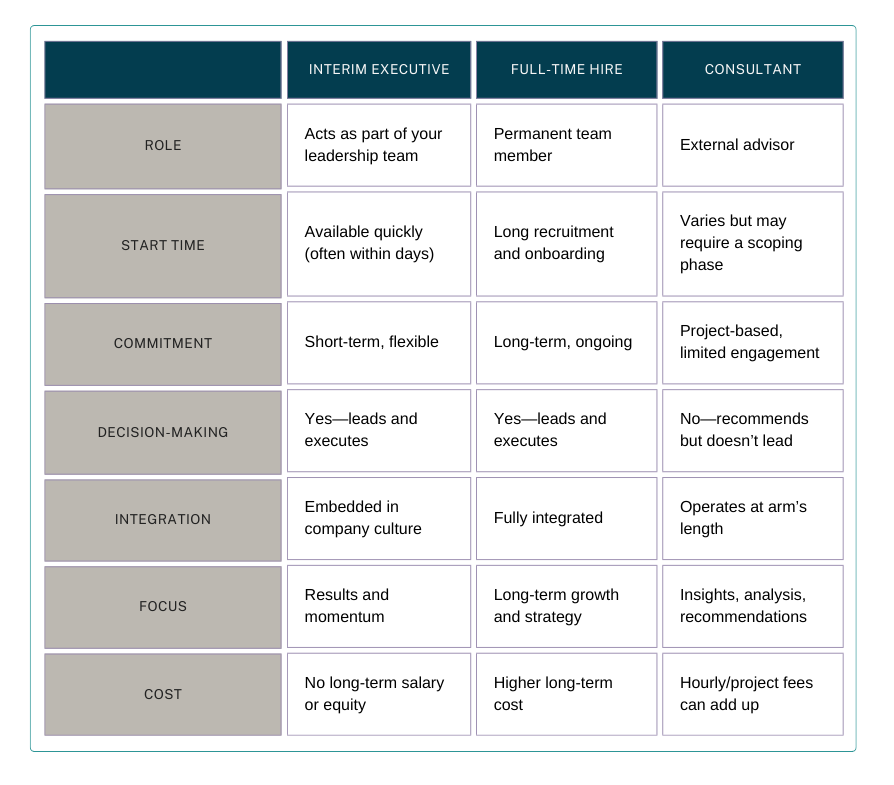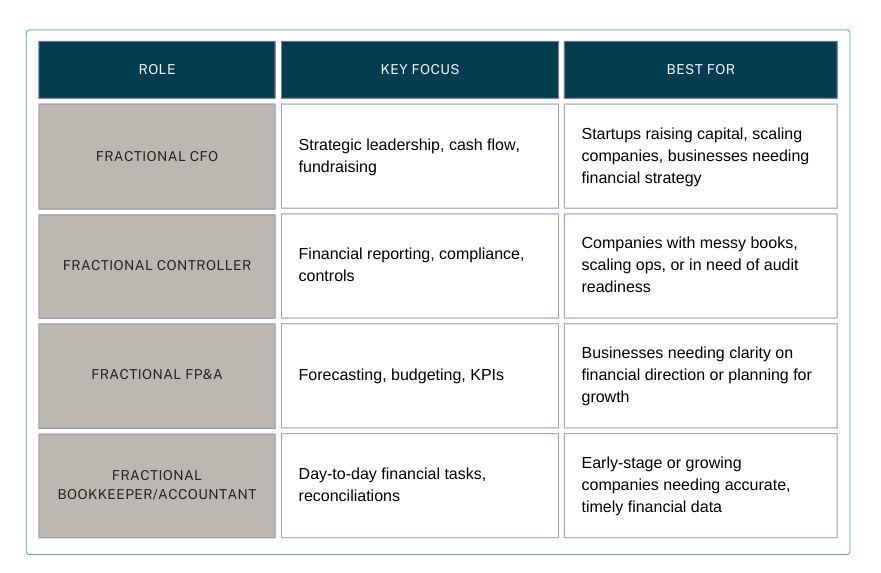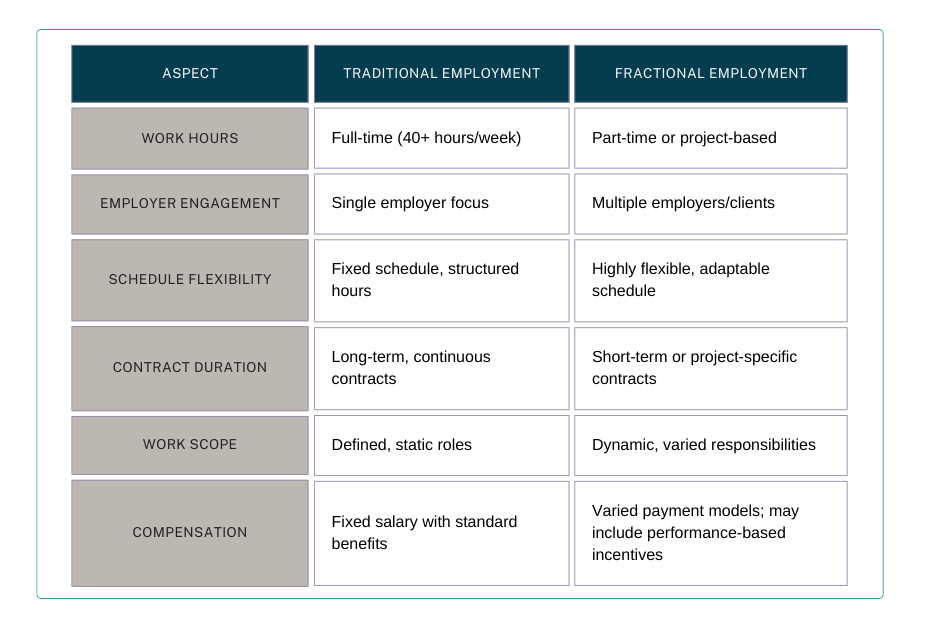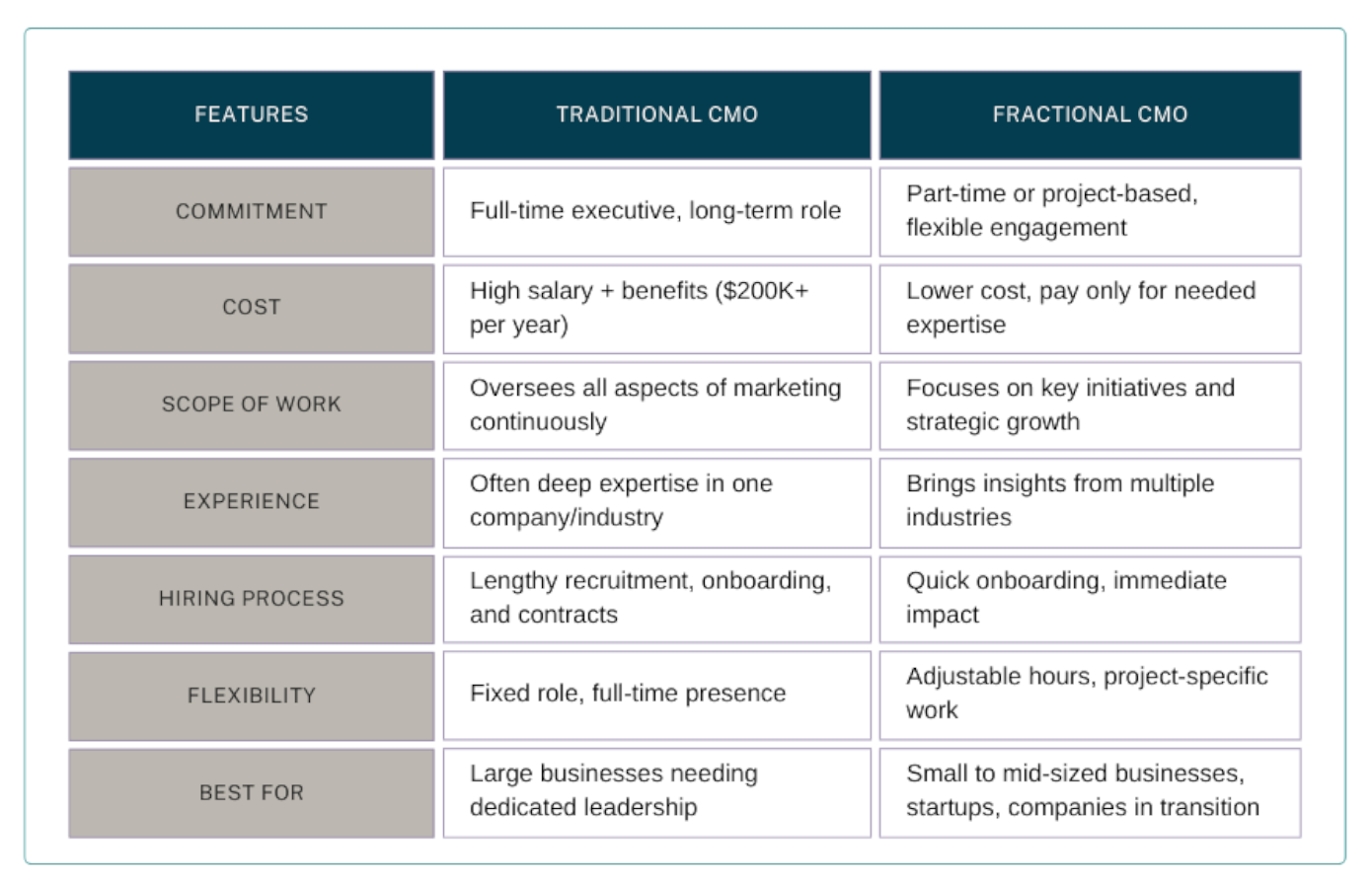When you’re elbows deep, ensuring the work gets done, you often realize you need help. But you’re too dang busy to pinpoint exactly what kind of help you really need. Especially if your company is growing quickly, you may feel like some vital functions are just getting lost or pushed to the back burner with no time for a business needs assessment.
It often isn’t until a financial malfunction (hopefully minor) that you realize you don’t have the expertise—or time—to deal with it. Or your marketing is gaining traction (congrats!), but you lack a consistent vision or leadership, resulting in inconsistent results. Perhaps you just feel like something isn’t working or working as well as it could. But you can’t quite put your finger on what it is.
At Next Fractional, we’ve simplified this step into a quick video chat. We skip the long surveys and endless (often repetitive) meetings without a clear vision or understanding of where you are even headed. Just an honest, open discussion that helps us (and you) understand exactly what’s needed. So, we can move forward with confidence to provide the results—and relief—you are looking for.
What Is a Needs Assessment?
In short, a needs assessment is a structured way of figuring out right where your business stands today, where you want to go, and the gaps that are standing in the way. It’s not a test, and you’re not on the spot. Rather, it’s a guided conversation.
The goal isn’t to get overwhelmed with data or to look at all of the possible directions you could go. It’s a time to clarify priorities. That way, everyone can work toward the same outcomes. After all, if you don’t know where you’re going, how will you know when you get there?
At its core, a needs assessment is designed to answer three main questions:
- What do you want to achieve?
- What challenges are getting in your way or slowing you down?
- What resources and leadership will help you close the gap?
We keep this process short, clear, and most importantly, actionable. We never enter a meeting without asking, “What decision do we need to make?” before we get started. This process allows us to get immediate clarity without the usual friction. It also ensures we can achieve the greatest impact with a quick video chat rather than waiting weeks into a consulting engagement before we are ready to dig in and find where we can help.
Example Needs Assessment Template
Here’s a simplified version of the framework we use:
Business Goals
- What are your top 3 objectives for the next 90 days?
- What outcomes do you want to see in the next year?
Challenges
- What or where are your biggest pain points?
- What’s impeding your progress?
Resources
- What’s your current expertise and bandwidth?
- Where are your biggest gaps?
Success Markers
- How will you define success? For example, what would a win look like 6 to 12 months in the future?
Next Steps (from decisions made in the meeting):
- Which projects or initiatives should be prioritized first?
- What kind of leadership (e.g., CFO, CDO, CMO, CTO, CIO, COO) would make the most impact?
Walking through these types of key questions leaves everyone with a clear action plan and next steps. We know where to focus and how to match you with the right fractional executive.
Why a Needs Assessment Matters
Make no mistake, a needs assessment isn’t just about identifying problems. It’s about putting together a roadmap to get to a win. By taking a step back and asking the right questions before getting started, you avoid a ton of wasted effort, time, and resources. Instead, every initiative is designed to move the business forward.
The key benefits include:
- Clarity—translating broad concerns (or even feelings) into concrete priorities
- Alignment—putting leaders, teams, and stakeholders on the same page from the first day
- Efficiency—by starting with a focused plan, you speed up decision-making and execution
- ROI—directs resources toward the fractional leadership that helps your team have the biggest impact.
In other words, instead of trying to guess what’s needed or figure things out as you go, you start with a clear action plan from your assessed needs.
Needs Assessment in Action: Real-World Scenarios
Of course, every business faces its own challenges. Fortunately, no matter what type of business you have, the needs assessment process remains consistent to help you cut through the noise and identify priorities.
Let’s take a look at a couple of real-life examples:
The Scaling Startup
Recently, a couple of founders came to us, on the verge of burnout. They were trying to do it all—like many founders. But with so much to juggle, they found their books were looking messy, they lacked the visibility they needed to make good decisions, and that was making cash flow tight. They were convinced the only solution was to hire a full-time CFO. But they weren’t sure they were ready (or able) to hire another executive.
They came to us to work through the issue and find the right solution for their business. During the needs assessment, we uncovered that what the team really needed was targeted expertise in financial modeling and budgeting. This would give them the visibility they needed to stay on top of not only cash flow but forecasting. Plus, it would support them as they prepared for potential investment opportunities.
Rather than hiring a new permanent executive, they worked with a fractional CFO who had the expertise to deliver the right structure, clear forecasting, and investor-ready reports.
Within weeks, the team had greater confidence in the numbers and were able to move forward with greater flexibility and confidence, without bloating payroll.
The Overwhelmed Marketing Team
Another company came to us because they felt stuck. Their marketing initiatives had stalled. In the needs assessment, we discovered that the problem wasn’t one of execution. Their team was working hard and had strong tactical skills. But they lacked leadership in digital strategy, business development, and communications. In addition, their talented in-house marketing team lacked senior-level guidance to tie campaigns to the company’s growth goals.
Instead of piling on more staff and resources, the company brought in a fractional CMO who was able to strengthen messaging. They were also able to help the team develop an international expansion strategy. In addition, they added deep analytics to measure and then improve results. That way, the marketing team could see what was working and pivot when needed.
This allowed the team to get immediate traction, build a stronger market presence, enjoy some momentum, and overcome overwhelm and disjointed efforts—all without increasing payroll. All because the team was now clear on where to focus instead of bouncing from one tactic to the next.
You can see why simplified, structured conversations to assess needs matter so much. By starting with the right questions, ensuring the team leaves with key decisions, and inviting in the right leadership at the right time, companies can avoid costly missteps.
Next Steps: From Insight to Action
Most of us would agree that we have too many meetings on our calendars! So, the last thing you may want to add is yet another meeting. Rest assured, a needs assessment isn’t just another meeting. It’s a structured conversation that’s designed to ultimately save time, money, and frustration by getting clear on what your business really needs. With this short, structured conversation, you can walk away with a clear understanding of how fractional leadership can support your goals.
Forget the red tape and endless consulting decks. At Next Fractional, we’ve made this process simple and effective.
If you’re ready to see how a needs assessment could help your business, book a free video chat with us to see if fractional leadership can accelerate your growth—at a fraction of the cost!



 When Does Interim Management Make Sense?
When Does Interim Management Make Sense?
 Benefits of Fractional Finance Management
Benefits of Fractional Finance Management
 Anatomy of a Fractional Contract
Anatomy of a Fractional Contract





